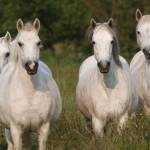Pasturing Horses with Cattle

Across the globe, horses and cattle can be found grazing peacefully together. Though it is a common practice, is it best for your horse’s health?
“Not to worry!” said Kathleen Crandell, Ph.D., a nutritionist with Kentucky Equine Research (KER).
Because both species are herbivores, cattle and horses thrive on the same grasses. Differences in anatomy, however, dictate what stands of grass each grazes, at least in terms of plant maturity.
“Horses have both upper and lower arcades of teeth, so they can easily nip grasses and graze close to the ground, or they can grab taller grass with no trouble,” explained Crandell. “Cattle, on the other hand, do not have upper incisors, which hampers their ability to tear grass at ground level. Instead, they use their tongue to grasp taller grass and then rip it once it has been pinched by the upper and lower jaws.”
While horses tend to have spotty grazing habits—undergrazing certain areas and overgrazing others—cattle seem to be less choosy, and will often graze areas avoided by horses. In this way, it is advantageous to graze the two species together as more forage will be used and less mowing necessary.
“Cattle and horses do not play host to the same intestinal parasites, so grazing them jointly will not contribute to the parasite burdens of each other. For horses, an appropriate deworming protocol should be discussed with a veterinarian to target prevalent parasites,” advised Crandell.
Although horse and cattle make suitable pasturemates, a few points are worth mentioning.
- Fescue is commonly used as a forage for cattle because of its hardiness. While many horses graze fescue without problem, it is not appropriate for broodmares, especially those in late gestation. A common endophyte that infects fescue causes reproductive problems in mares, including prolonged pregnancies, thickened placentas leading to difficult births, and insufficient milk production. “For most horses, fescue should not be a problem, but it is a nonnegotiable no-go when it comes to broodmare nutrition,” said Crandell.
- Horses and cattle might have to be separated if cattle are fed a concentrated form of energy such as a grain mix. Many cattle feeds contain additives that are harmful, even lethal, to horses, so it is never wise to offer cattle feed to horses.
- Fencing requirements vary between the species. Though cattle seem to be contained easily enough with barbed-wire fencing, it should not be used to enclose horses as devastating injuries can occur.








